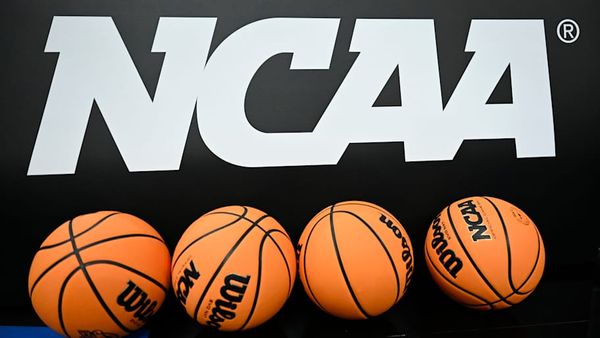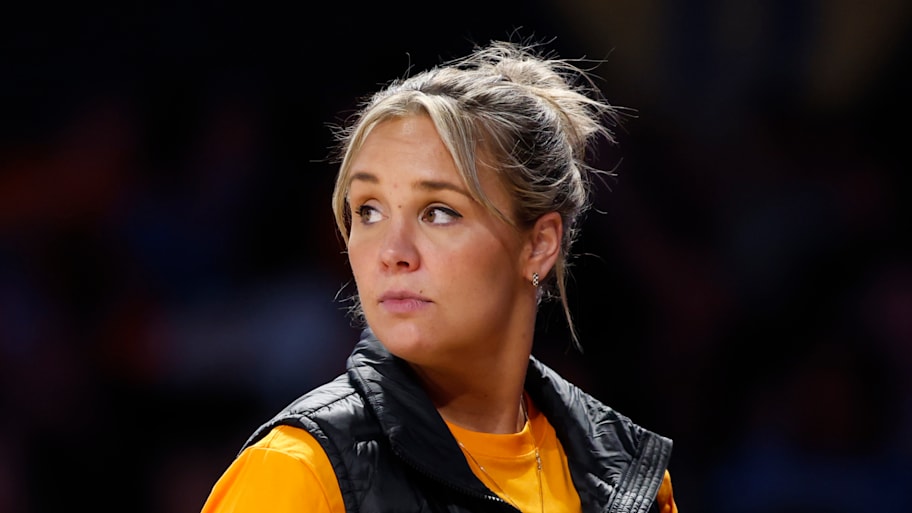
Kim Caldwell has been running her system for a decade now, which is long enough to have internalized every relevant question, complaint and frustration. There are plenty of them, and she can understand many, but there is one that has always bothered her. She hates when people call it a gimmick. If her teams look unorthodox—pressing aggressively, shooting on sight, making group substitutions like a hockey team makes line changes—that’s only in service of strategy. The coach hates the idea that she runs this for attention or novelty or style points. Caldwell runs it to win.
The system is a useful key here. It’s a reflection of the basketball philosophy that Caldwell has installed as the women’s head coach at No. 15 Tennessee. And it’s an answer to many of the questions that swirled when she was hired last year.
Such as: Is a 35-year-old with one season of Division I head coaching experience, someone who has never been on staff at a Power 4, truly ready for Tennessee, of all places? Or: Who can actually sell modern top recruits on a model of constant subbing and less playing time? Or: In a program so entwined with its architect, even all these decades later, where every NCAA coach has been either Pat Summitt or someone who played for Pat Summitt, how do you hire someone who has never stepped foot on campus? Or: Who?
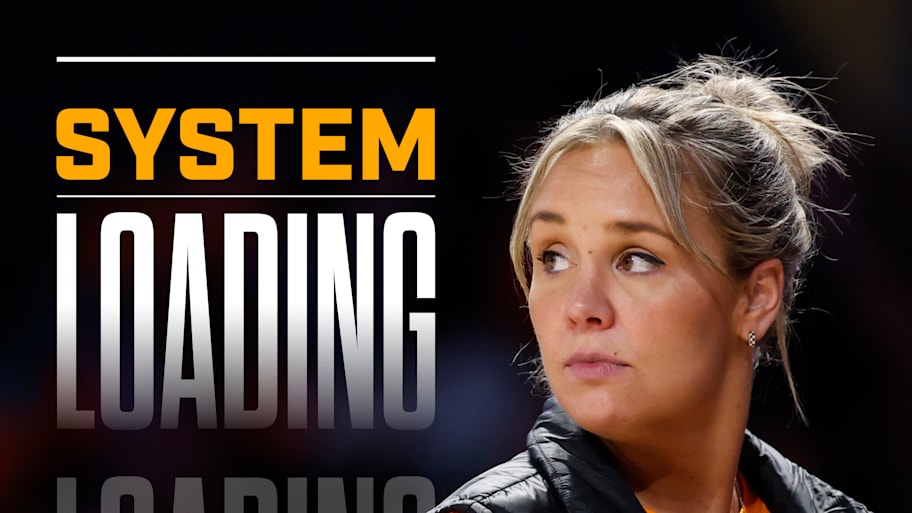
The answers come not so much from the system itself as from what it says about the person who runs it. Volunteers athletic director Danny White and the hiring committee liked what they saw in Caldwell’s record at D-II Glenville State and in her lone D-I season at Marshall. And they especially liked what they saw in a coach bold enough to try an unusual style, creative enough to make it her own, and self-assured enough to remain committed to it.
“I was hired to do this,” says Caldwell, now 36, perched on a couch in her office shortly before the start of the season. “If this is what you want me to come here and do, then I’m going to come here and do it. If you want me to come here and do something else, I’m not the person for the job.”
Tennessee decided that it needed something new, even if that something might be rather polarizing, and that no better coach for that existed than Caldwell.
Her first season was one of transition. Operating with much of the same roster that was already in place—just one player transferred out—Caldwell installed her full-court press with hockey substitutions and high shot volume. They scored more than any Tennessee roster in 20 years. They beat archrival UConn. But they did not end with an especially deep postseason run. Caldwell brought Tennessee back to the Sweet 16, further than it had gone in the final season under her predecessor, Kellie Harper, but no further than it had gone in the few seasons prior. And that came amid massive personal change for Caldwell. She learned before the start of the season that she was pregnant with her first child, and she gave birth in the middle of conference play, navigating early motherhood while preparing for March Madness. She ultimately missed just one game.
All of which has set up this season to be far more comfortable by comparison. Caldwell did not have to share her system to an entire roster from scratch this year. She did not have to learn how to adequately harness the resources and status of a top program. And, of course, she did not have to do all of the above while expecting her first baby.
If last season offered a proof of concept for her vision, this season gives her a chance to produce a more complete prototype. A year after a coaching experience unlike any other in her career, Caldwell is out to prove that nothing here is a gimmick.
Like any compelling strategy, Caldwell’s system carries a tangle of influences that include odd names and tiny gyms. It can look chaotic—players throwing up shots early and often, pushing the pace beyond the point of precision, often with a full complement of teammates crowding around on the sideline waiting to be subbed in. But there is considerable structure here. In an early film session last year, Caldwell printed out a rule sheet for each player, and they went down the list of guidelines one by one. Their coach understood if they needed some help to fully grasp the strategic framework here. And she understood if they had watched it for the first time and thought: Absolutely not. Because that was Caldwell’s initial reaction to this system as a player, too.
The youngest daughter of a championship high school basketball coach in Parkersburg, W.V., Caldwell played her college ball nearby at tiny Glenville State. Her first two years with the Pioneers were unexceptional. Then came a new coach by the name of Bunky Harkleroad.
What he introduced was not quite the same as what Caldwell runs now at Tennessee. But the core principles were similar. Harkleroad had a few obvious inspirations: There was the DNA of Paul Westhead’s old run-and-gun teams. You could guess that Harkleroad had once visited David Arsenault at Grinnell College, picking his brain about his offense, famously high-scoring, later famously accused of being rather gimmicky itself. But Harkleroad mixed those insights with some that were all his own when he came to Glenville State in 2009.
The high-octane, fast-moving offense came with a full-court press on defense. Harkleroad’s goal was to maximize possessions—shooting quickly when they had the ball and doing everything possible to force turnovers when they did not. That required all players going at maximum effort, then being subbed out when they had played to the point of exhaustion, sometimes five in, five out, after just a few minutes.

Caldwell hated it so much that she called home and told her parents that she was transferring.
But she ended up sticking around. Caldwell felt the roster grow closer: There was less of a divide between starters and bench players when everyone needed to play serious minutes. And the offense was fun and freeing. Caldwell was taking more shots than she had in the previous two seasons even though she was logging fewer minutes. For the first time, she was playing on the perimeter and putting up threes: The system required a kind of speed and fluidity that made it almost positionless and saw nearly everyone shooting from deep. Caldwell knew what it was like to feel overwhelmed and ground down by this system. And she knew what it was like to reach a point where it clicked and she began seeing and feeling the game differently as a result.
That experience shaped how Caldwell would approach the system as a coach. She joined Harkleroad’s staff as an assistant when he moved up to Sacramento State in 2013. (It was there that the system received modest national attention for the first time.) But it would be just a few years before she came back home to West Virginia. The former Harkleroad assistant in charge at Glenville State was now leaving the program, and the school wanted to keep the job in the coaching tree, which meant calling up Caldwell.
She was just 26. And while she was hired with an explicit mandate to keep running the system—local fans loved the speed and the scoring—Caldwell had ideas about how to maximize its potential. The system had been popular so far at Glenville State, and it had generally produced winning records, but it had not come with massive success or deep tournament runs. Caldwell believed that she might be able to change that.
She immediately became close with the college strength and conditioning coach, Nolan Harvath, whose job involved working with all of the sports on campus. (Remember: D-II.) Suddenly his toughest workouts and earliest mornings were coming from women’s basketball. “I loved that team,” Harvath says. “They had an edge. They wanted to work.” The system had always been predicated on playing to exhaustion before getting subbed out. Caldwell pushed her players to run the press even more intensely and embrace that idea even more.
That buy-in required trust and open communication. Caldwell told players exactly what she wanted from them and why. “She is who she is,” says Jenna Burdette, a fellow West Virginia native who joined her as an assistant at Glenville State. “There’s no sugarcoating with her.” And she fostered the kind of family atmosphere that most teams only joke about. In her first head coaching job, still just a few years removed from college herself, Caldwell brought on her father as an assistant and her mother as director of basketball operations. She wanted a dynamic where everyone felt like they were loved enough to be able to demand the most from each other.
“I was a little bit embarrassed about it,” Caldwell says. “Oh, you need your mom and dad. But it became the greatest thing.”
She also leaned into something that she had picked up on while playing in the system herself. Most players are used to being subbed out for mistakes. Getting pulled off the floor can feel like either a punishment or a statement of weakness. But this system does not work like that. It’s built to run at a pace that is so fast it all but requires that players will make a few mistakes, and it’s built to get players so exhausted that being subbed out feels like a gift, not a penalty. Caldwell made that into an ethos of sorts.
Her players learned that she would forgive mistakes but would not forgive a lack of effort.
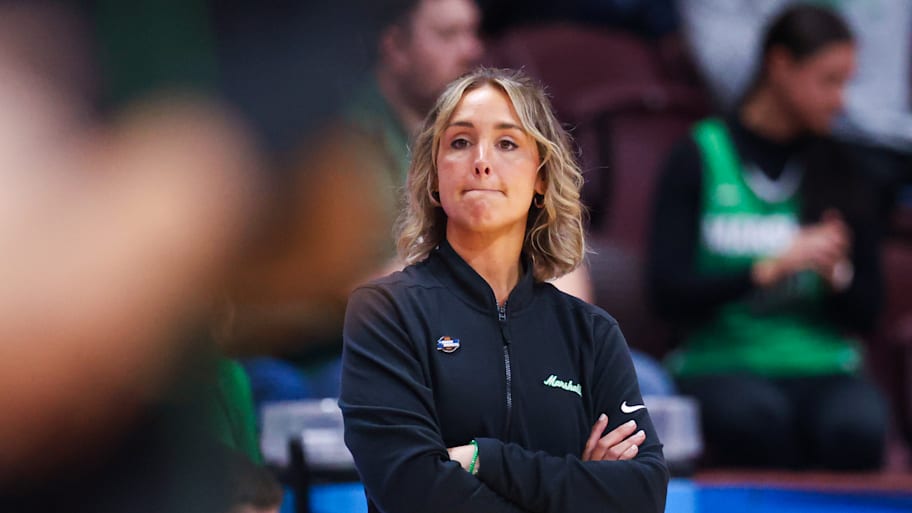
Caldwell’s seven years at Glenville State brought six conference titles, two Final Fours, and one D-II national championship.
“It was like a running joke in the athletics department,” Harvath says. “She ain’t gonna be here for long.”
The joke turned out to be true. Caldwell stayed in the state of West Virginia but made the leap to D-I when she headed to Marshall in 2023. She installed her version of the system in her first season, and she took the school to its first NCAA tournament since 1997, along with winning the award for Division I Rookie Coach of the Year. And in the spring, as she was preparing to renegotiate her contract and stay in place for a while, she got a call for an interview that she had to take.
“How do you say, No, I’m not going to interview for Tennessee, right?” Caldwell says. “How do you do that?”
The program meant as much to Caldwell as it meant to anyone who had been a little girl obsessed with basketball in the 1990s. An entire generation had experienced the sport through what it saw at Tennessee. But that dynamic had since disappeared. The program was still among the most decorated in the sport, with eight national championships won by legendary coach Pat Summitt, stretching from 1987 to 2008. Yet it had found itself somewhat adrift over the last decade without her. Tennessee had stayed as close as possible to Summitt with its two subsequent coaching hires: Holly Warlick, a longtime assistant, and then Harper, a beloved former player who had built up head coaching experience at several other schools first. But the program never matched its previous heights. Forget the Final Four. The last eight seasons under Warlick and Harper brought just two trips to the Sweet 16 for the Lady Vols.
Yet it still came as a jolt when Harper was fired with four years left on her contract. Tennessee was finally striking out to look for something different. And that led to Caldwell.
She was honest about everything that she did not know. Caldwell had never enjoyed access to a large staff. Never handled national media. Never interfaced with donors who had millions of dollars or with alumni who had starred as Hall of Famers. Never interviewed with a program that apologized for not flying her on a university jet because it would have been tracked by fans—although, really, that sounded a bit like coaching in small-town West Virginia, where she couldn’t go to the grocery store without being recognized by someone who wanted to talk about the team. She had so little relevant personal experience for so many of these questions.
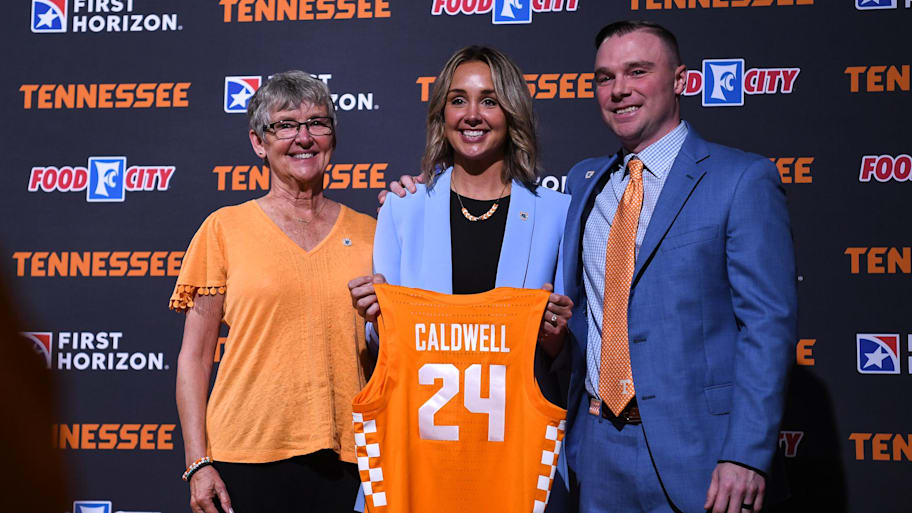
But she was just as candid with the committee about what she did know. Caldwell laid out why she felt her system was effective and how it might look at Tennessee. She described how she would sell her vision to players: Yes, they’d get fewer minutes, but they would be playing with more freedom, in an offense that might look unusual but that actually had much of the pace and spacing of any savvy, modern team. She knew how to share all of these principles with skeptics: Caldwell had been doing that for years, winning over players and assistants and even her own father, who had plenty of doubts when he first joined her staff at Glenville State. She explained the adaptations she had made in recent years, the changes in the half court, the new sets in the offense. She detailed what she believed and why.
“I went into it very much—I’m having a conversation and I’m being myself,” Caldwell says now. “And they could basically say, Hey, she’s great, she’s who she want, or, No, she’s not ready.”
Caldwell had never been to the University of Tennessee. But she had been close once, a few years prior, when Glenville State drove all the way to Alabama for the NCAA tournament. One of their pit stops was a shopping center in Turkey Creek, less than half an hour from campus on the edge of Knoxville. That was close enough for Caldwell to let her mind wander: What could I do in a place like this? And then she cut it out: You are a Division II coach daydreaming on an 11-hour drive. She had begun to seriously consider what it would mean to move to a bigger program: There had been modest interest from D-I, some mid-majors, talk of a potential offer from Coastal Carolina. A reasonable career ladder. The kind that made sense as a scaffold for her dreams. And here she was fantasizing about Tennessee.
Two years later, when Tennessee brought Caldwell in to interview, the hiring committee hosted her at the university golf facility and at the home of the athletic director. The process was too secretive to risk her being spotted at the core athletics complex. And so the first time Caldwell actually saw what had fueled her old daydreaming—the banners, the national championship trophies, the eight-foot statue of Summitt—it was when she was walking into her first press conference as the new head coach of Tennessee.
It set up a hectic transition period. Caldwell introduced herself to her players and her players to her system. (When she was hired, Tennessee had been on spring break, and so the players were told about their new coach via Zoom. The name did not ring any bells. “I immediately went on YouTube,” says redshirt senior guard Kaiya Wynn. “I was doing my own personal research.” And so part of spring break was devoted to sending around clips from a school that none of them knew called Glenville State.)
The new coach was quick to lay out her expectations, which were high. But some players found that refreshing. Among those Caldwell reached out to in the transfer portal was 6' 4" forward Zee Spearman. She had played two seasons at Miami and did not believe she had any interest in Tennessee. But she was fascinated by how Caldwell sold her once she got her on the phone. The coach told her that she would have to run more than she had ever run in her life and that she would have to play a style that would feel totally unfamiliar. Then she told her why she believed that would be worth it for Spearman. “I’m so used to coaches telling me different things,” Spearman says. “But she wasn’t trying to tell me what I wanted to hear. She just told me straight-up.” The player was surprised to realize that she agreed. And versions of that conversation played out up and down the roster.
Caldwell wanted every player to be very clear what this was and how it would look for them personally. For a young coach with a progressive strategy, in some ways, she was decidedly old-school. “This is the standard,” Caldwell says. “We don't touch our knees, we don't talk back, we make our sprints, we run through the lines, all of those things.” That was what Caldwell felt was required by her system and required by the culture of Tennessee.
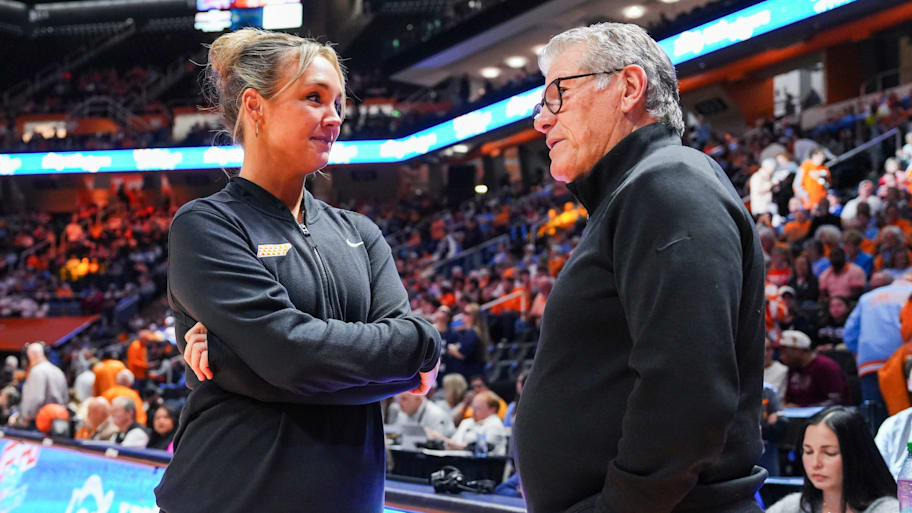
Which the players understood. And when they started running, in the grueling workouts designed by Harvath, whom Caldwell had brought along with her to Tennessee, they really understood.
“I was like, Oh, wow, so we’re about to die,” Spearman says. “But the thing was that we were all dying together. It was everybody’s first time.”
Caldwell told her team how important that feeling was. Maybe they felt like they were going to die. Maybe they hated their new coach a little (or a lot). But they would all feel that way together, and if they hated her now, it was ideally so they could love her later. Everything was going to be a little bit uncomfortable in this first season. But they were going to share in that discomfort, all of them, even Caldwell.
Which felt like a very different concept for their coach when she learned that she was pregnant.
“I was talking to God,” she says. “We’re going to do this now?”
Caldwell and her husband, Justin, had tried for a baby in the past. Instead, it happened just when she was taking on a new job that felt completely all-consuming, while the couple was still looking for a house in their new town. She automatically felt as if she was letting her team down. Now, a year later, that reaction feels ridiculous. But Caldwell could not frame it to herself any other way in those early weeks.
“I was hired to do this job,” she remembers thinking. “I was hired to coach these players. And everyone’s going to be disappointed in me, because now I’m not going to be able to be there for them the way they need me to be.”
No one else shared that reaction. When she was ready to tell the administration, they showered her with congratulations, offering resources and sharing how coaches in other sports had navigated pregnancy. Caldwell still dreaded telling her players. “I was terrified,” she says. She was sure that her news could only be received by them as a disappointment.
Caldwell decided that she would tell them in a private meeting. No staff, no other coaches, just her and her new players. A social media staffer asked if Caldwell would like someone to film the announcement, not even to share publicly, maybe just for her to have. She could hardly believe the question. “This is not going to be a good meeting,” she blurted out. And she believed it. Caldwell had asked her new players to give her everything, and now she was going to tell them that her due date was in January, right in the middle of conference play.
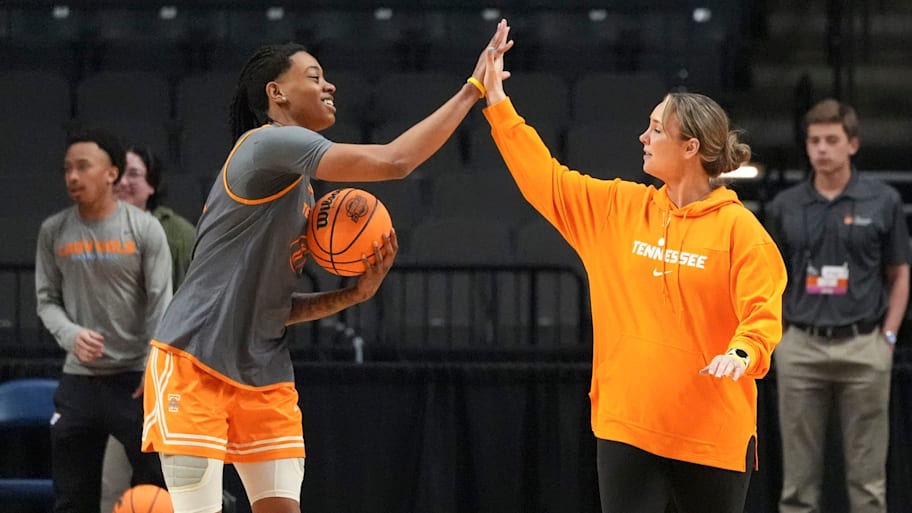
Which, of course, did not matter. None of Caldwell’s fears around this mattered. Her players were ecstatic. “Team — baby!” they chanted. “Team — baby!” Some of them quickly set about figuring out the astrological sign. A few squealed about a baby shower. “We were so hype,” says Spearman, who bought little toy racecars for the baby when she learned that it would be a boy. There was none of the disappointment that Caldwell had expected. Instead, she felt surrounded by love. She walked away thinking something that she could not have imagined a few hours earlier.
Maybe I do wish they had filmed that.
It set up her first year at Tennessee to be humbling in ways that she had not expected. Players had joked in the past that she never so much as leaned on the scorer’s table. Now Caldwell would actually have to occasionally sit down. She estimated that she had missed one practice in her career, back at Glenville State, in the hazy stretch of grief after her father died. Now she would have to contend with potentially missing several games. She had built her career around a system with clear, defined standards that required maximum effort from every person in every single moment. And now Caldwel would have to give up a little control and introduce a little compromise.
Caldwell missed one game after giving birth to baby Conor. He was in the stands for the first time about two months later: His dad was holding him as Tennessee dropped a close game to No. 1 seed Texas in the Sweet 16. And while Caldwell pushed back her maternity leave, she did use it, ultimately giving herself six weeks over the summer.
“I learned more last year as a coach than I had ever learned in my career,” Caldwell says. That, of course, meant learning as a person, too.
This season represents a chance to put all of that learning into practice. Caldwell knows Tennessee now. Her players know her system. The women’s basketball world knows Caldwell. And now they all will see if her vision can make the program into a contender again.
In theory, much should be easier this year. Everyone on the roster either played in this system last year or was recruited specifically to play in it this year. (Tennessee’s No. 2 ranked class of recruits is highlighted by a set of speedy guards, including twin sisters Mia and Mya Pauldo.) It could feel like the Vols were constantly stopping practice last year to fix their execution of the press. That’s less common now. The system’s emphasis on offensive rebounds means that when a shot goes up, four players should run forward to crash the boards, rather than running back to get on defense: “It sounds simple, but I mean, that took us weeks to get last year,” says Burdette, now an assistant at Tennessee. Players have internalized the foundation now.
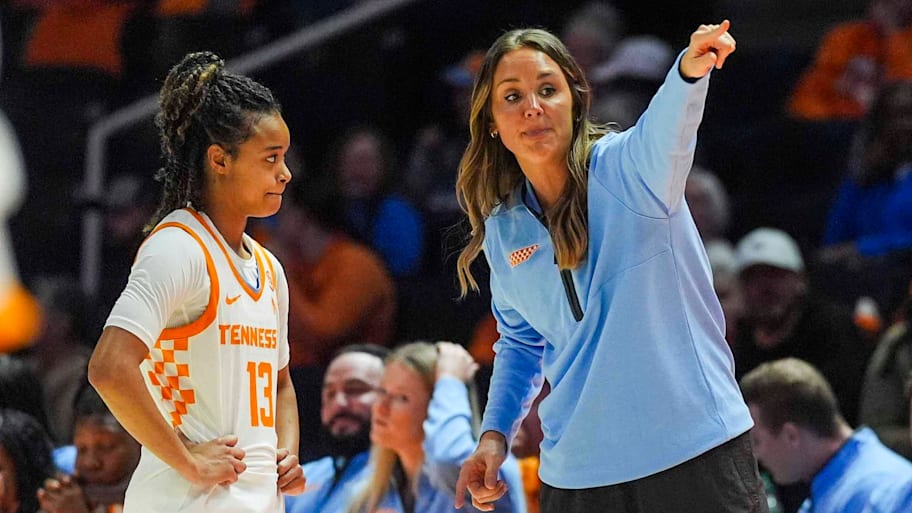
“I'm sure she got so annoyed with us, having to tell everybody the same thing 30 different times,” Wynn says. “But then there's a point where it just kind of clicks, and then you see it clicking for other people… So when people look, and they watch us, they think we’re out there just going off instinct. But it’s actually something we practice for months.”
But greater familiarity does not always lead to better execution. The Lady Vols were reminded of that when they were doomed by poor shooting in a close loss during their season opener to NC State. An ideal box score for Caldwell involves forcing 25 turnovers and grabbing 45% of the potential offensive rebounds. They have not yet been hitting those numbers. And they know that SEC play will bring more challenges. The conference is familiar with their press now. It has plenty of smart, adaptable coaches that will have strategies to break it.
Tennessee will counter that with a coach who feels more settled in place than she did last year. “She’s wrapped her head around everything, because it happened fast for all of us,” Harvath says. “I think her swagger, her confidence is back.” Her players see that, too.
“She’s very human to us,” Winn says. “It’s very easy to relate to her because she does a good job of relating to us. She’ll tell you when she doesn’t have all the answers… She’ll make it really easy for you to trust her and know and believe in what she’s saying, because she believes in it herself, and then it just trickles down to everybody else.”
And what Caldwell believes is that what she is building at Tennessee is for real.
More College Basketball on Sports Illustrated
This article was originally published on www.si.com as Kim Caldwell Believes in Her Unconventional Basketball Style—And So Does Tennessee.

